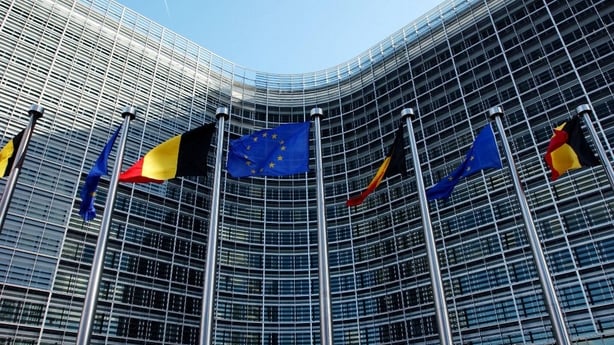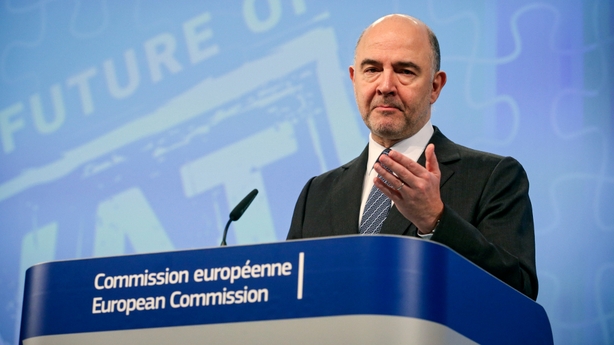Big internet companies could be hit with a levy of 3% on their turnover if a European Commission proposal published today becomes law.
Plans for an "interim tax" - intended as a temporary measure - would establish a way of taxing activities that are not currently taxed.
The money raised would be allocated to every country in the EU depending on how many users of a digital service - such as Facebook - they had in their country.
The new tax would apply to revenues created from activities where users play a major role in value creation - such as social media networks where users "like", upload, comment, search or click on content.
All of this activity generates data on the users that can be used to sell targeted advertising.
Facebook, Google and "free" Spotify (where users receive advertising instead of paying for a subscription) would generate taxable activity.
The proposal would also capture "platform" technologies that enable two users to interact commercially, such as AirBnB or parts of the Amazon offering that allows two customers to transact a sale between themselves.
E-commerce that involves the direct sale of a good or service, such as Amazon's direct retailing business, or paid for Spotify music streaming subscriptions, would not be taxed under this proposal.
Big internet firms face 3% levy on turnover if EU proposals approved pic.twitter.com/sNBOPCe3Ci
— RTÉ Business (@RTEbusiness) March 21, 2018
In a major departure from existing tax practice, tax revenues would be collected by the member state where the users of the service are located if the "interim measure" is adopted.
The European Commission thinks a 3% tax would raise about €5 billion a year, which would be allocated across all EU states.
Q&A on a 'fair and efficient tax system in the EU for the Digital Single Market
The tax would only apply to companies that have a global turnover greater than €750m and EU revenues of more than €50m.
This is intended to protect start ups and scaling businesses from the effects of the tax.
Under existing tax models, a country only has the right to tax a company if it has a taxable presence or "permanent establishment" in that country.
The rise of digitisation has made it easy for companies to service multiple markets from a single "establishment", and so fall outside the scope to existing rules that were drawn up for traditional "bricks and mortar" businesses.
This has led many countries to become concerned that their source of tax revenue is shrinking.
To deal with this problem, the Commission has also proposed a wider reform of corporate tax rules, so that profits are registered and taxed where businesses have significant interaction with users through digital channels.
This measure would allow member states to tax profits (as distinct from turnover, in the "interim measure") that are generated in their territory, even if the digital company making those profits has no physical presence in that country.
"The time has come to make our tax system fit for the 21st century" says @pierremoscovici
— European Commission 🇪🇺 (@EU_Commission) March 21, 2018
Today, we will unveil our proposal for a #FairTaxation of the digital economy. #DigiTax pic.twitter.com/lzZbRrY3Md
Under the proposal, a digital platform will be deemed to have a taxable "digital presence" or virtual permanent establishment in an EU member state if it meets any one of three criteria:
- It exceeds a threshold of €7m in annual revenues in a member state.
- It has more than 100,000 users in a member state in a taxable year
- Over 3,000 business contracts for digital services are created between the company and business users in a taxable year.
The proposed new rules would also change how profits are allocated to member states.
The European Commission said the new system "secures a real link between where digital profits are made and where they are taxed".

It said the new measures could be incorporated into the planned Common Consolidated Corporate Tax Base - a plan the Commission has already presented to allocate the profits of large multinational groups based in part on where their products or services are sold.
A proposal to allocate corporate income tax rights based on geography and population weight would favour the tax regimes of bigger member states.
On Friday the OECD, which is also working on ways to modernise the international rules of corporate tax to take better account of digitalisation, said it does not recommend the introduction of interim measures by individual countries or groups of states.
On the same day, US Treasury Secretary Steven Mnuchin said the US was opposed to any tax measures that targeted US digital companies.
He said the US favoured a global approach to modernising the tax rules.
The Government has opposed the EU interim measure, saying it favours a global approach to corporate taxation of the sort being developed by the OECD.
The proposal will be discussed by EU leaders at their summit in Brussels tomorrow.
As it is a taxation measure, it can only become law if all EU states agree to the measure.
In a statement, the Commission said that current tax rules were not designed to cater for social media companies, collaborative platforms and online content providers who are now global, virtual or have little or no physical presence.
It noted that nine of the world's top 20 companies by market capitalisation are now digital compared to one in 20 ten years ago.
"The challenge is to make the most of this trend, while ensuring that gigital companies also contribute their fair share of tax," the Commission stated.

Pierre Moscovici, Commissioner for Economic and Financial Affairs, Taxation and Customs said the digital economy is a major opportunity for Europe and Europe is a huge source of revenues for digital firms.
"But this win-win situation raises legal and fiscal concerns. Our pre-Internet rules do not allow our member states to tax digital companies operating in Europe when they have little or no physical presence here," the Commissioner said.
Commissioner Moscovici said the proposed interim digital tax would apply to about 120 to 150 companies. Roughly half of them would be US owned, and roughly one third would be European companies.
Mr Moscovici said it was necessary to move ahead with an interim measure to prevent individual member states introducing their own methods of taxing digital companies.
He said this would weaken the EU single market by introducing "a patchwork of tax measures" rather than having a single method that would be easier and more certain for businesses to deal with.
"Surveys have shown that citizens are waiting for us to tax properly the digital economy - it is a matter of fairness, and it doesn't matter if Member States are big or small," the Commissioner said.
He said discussions on the issue will not be easy, but he believed the measure had been carefully prepared and was a good basis for agreement, which he hoped could be reached before the end of the year.






